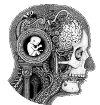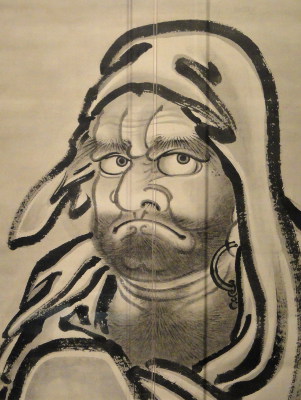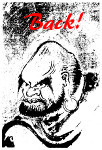 This does not mean that you are not reading this, or that existence is an illusion, but rather that we tend to
think of ourselves as a separate presence in our head – a little homunculus looking out through your eyes like a
view through a television set. The brain is clearly the seat of the 'mind', because we know what happens
if pieces of it deteriorate, and if it becomes too damaged, we become demented – we lose our minds, including our
sense of self. This simple fact suggests that brain and mind are inseparable, but it does not tell us what is
going on.
This does not mean that you are not reading this, or that existence is an illusion, but rather that we tend to
think of ourselves as a separate presence in our head – a little homunculus looking out through your eyes like a
view through a television set. The brain is clearly the seat of the 'mind', because we know what happens
if pieces of it deteriorate, and if it becomes too damaged, we become demented – we lose our minds, including our
sense of self. This simple fact suggests that brain and mind are inseparable, but it does not tell us what is
going on.
When trying to explain consciousness, the mind or brain is sometimes compared to a computer, but this is wrong for at least two reasons. The first is that most people have absolutely no idea how a computer actually works, and the second is that the analogy is too incomplete. However, the concept of a computer – or mind – as a way of processing information is a good place to start. Briefly, we can think of the basic physical infrastructure of the brain as the hardware in a computer. The brain is vastly more complicated than a computer, but its function can be thought of as similar; it takes in real-time input from the senses and processes that information depending upon which 'program' is running, and like a complex computer program, the information can, in turn, modify the program to produce entirely different results the next time an identical stimulus is received. There are any number of 'programs' inhabiting our brains, and they can spawn new ones, kill off old ones and 'talk' to each other.
Simulation programs, such as “Sim City” can take a relatively simple set of operational rules, and as the player changes a few circumstances, the program spawns software agents which interact with each other in ways that become increasingly complex – almost as if they were alive. With the capacity and flexibility of the brain, the possible complexity that can be generated is almost limitless. But where does this leave the basic question of who or where we are, and by 'we', I mean the person in our head who is reading this. 'We' are clearly not the body, including the brain in our heads. 'We' are also not the wet ware 'programs' in our brain. 'We' are something even more ephemeral; we are the process itself, and there are only two components to the process.
The two, and only two things required for self-awareness are real-time sensory input and long-term memory. There are conditions and medical problems which can illustrate this. If a person is deprived of (almost all) real-time sensory input, thought processes rapidly disintegrate and the subject can lose all feelings of self. This has been done experimentally and also for reasons of information extraction. Thus, real-time input anchors the consciousness in the present, but to make any sense of who we are, we need a second anchor, in our past, and this is the task of long-term memory.
Just as you never really forget how to ride a bicycle, forgetting a phone number is a common occurrence. The brain seems to store these different types of knowledge in different ways, one far more secure than the other. Remembering who we are seems to lie in the less secured region. There are rare conditions where people are unable to convert short-term memory to long-term memory, and even worse, have no ability to access what long-term memory may exist. They are conscious of the present, but anything occurring more than a minute or two ago is gone forever. They literally can't remember who they are and are incapable of re-learning it; they can exist only in the present. They have their 'securely stored' knowledge, such as speech, comprehension and other skills necessary for survival, but they have the feeling of being 'reborn' every few minutes as they forget their past existence of moments ago. Quite literally, we are what we remember ourselves to be.
 Speaking of bicycles, here is a non-computer analogy. Think of your body as a bicycle which you are riding.
Your real-time input keeps you in balance, your long-term memory tells you where you have been and plans where to
go next, and the road underneath you is your travel through life. But, 'you' are not really the road nor
the bicycle but the dynamic process of the ride itself. Like personal consciousness, it is the process that we
experience and that keeps everything going. So what happens to the ride when bicycle stops? It vanishes like it
was never there, and that is the thing which few can accept and the reason people will thrash around to pin the
self of person-hood on some object, material or immaterial, so it will have an independent existence.
Speaking of bicycles, here is a non-computer analogy. Think of your body as a bicycle which you are riding.
Your real-time input keeps you in balance, your long-term memory tells you where you have been and plans where to
go next, and the road underneath you is your travel through life. But, 'you' are not really the road nor
the bicycle but the dynamic process of the ride itself. Like personal consciousness, it is the process that we
experience and that keeps everything going. So what happens to the ride when bicycle stops? It vanishes like it
was never there, and that is the thing which few can accept and the reason people will thrash around to pin the
self of person-hood on some object, material or immaterial, so it will have an independent existence.
And I think that should be the subject of another meditation.

